Will Civilization Collapse?
The following is a transcript of the video found below.
“I see in you all the characteristic stigma of decay. I can prove to you that… your atheism and your pessimism and your cynicism, your immorality, your broken-down marriages…were characteristic marks of the dying ages of ancient States.”
Oswald Spengler, The Decline of the West
Are we living in an age of civilizational collapse? In this video series we are going to examine what led past civilizations to fall, in order to determine whether ours is in danger.
“Wise men say…that whoever wishes to foresee the future must consult the past; for human events ever resemble those of preceding times.”
Niccolò Machiavelli, Political, Historical, and Literary Writings
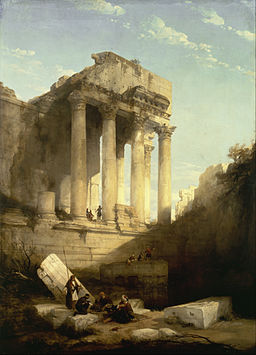
In attempting to explain why civilizations collapse, historians and social scientists distinguish between external and internal causes. An external cause is a force or phenomenon, in other words, that imposes itself on a civilization, overwhelming its capacity to cope. Examples include invasions from a foreign enemy and so-called acts of god, such as epidemics or natural disasters. Some historians claim Minoan civilization collapsed due to a volcanic eruption, while others propose that malaria played a major factor in the fall of Rome. Historians of Mesoamerican civilization allege that the famed city of Teotihuacan fell due to invasion by northern barbarians, while the role of Germanic barbarians in the collapse of the Roman Empire has been well documented and discussed.
As attractive as external cause theories are, they do not adequately explain why civilizations collapse. All great civilizations withstand natural disasters, persist through epidemics, and successfully defend themselves from attack. It is only when they lose the strength, resilience, and adaptive capacities to deal with external crises that they decline and fall.
As external cause theories do not sufficiently explain why civilizations fall, we need to turn our attention to internal causes of collapse and investigate what causes a civilization to weaken – to rot from the inside out – and eventually reach a point where an external crisis becomes the proverbial straw that breaks its back.
“A great civilization is not conquered from without until it has destroyed itself from within.”
Will Durant, The Story of Philosophy
In the 20th century, Sir John Bagot Glubb, better known as Glubb Pasha, penned a little-known essay titled the Fate of Empires and the Search for Survival. In this essay he put forth the thesis that civilizations are akin to biological organisms in the sense that they have a natural lifespan, and they progress through a series of stages marked by growth, decline, and eventually death. By tracing the progression of these stages, we can gain greater clarity into how, and why, civilizations destroy themselves from within. Or as Glubb Pasha wrote:
“The experiences of the human race have been recorded…for some four thousand years. If we attempt to study such a period of time in as many civilizations as possible, we seem to discover the same patterns constantly repeated under widely differing conditions of climate, culture and religion…The life-expectation of a great civilization, it appears, commences with a violent, and usually unforeseen, outburst of energy, and ends in a lowering of moral standards, cynicism, pessimism and frivolity.”
John Bagot Glubb, The Fate of Empires and Search for Survival
According to Glubb, the first stage in a civilization’s lifespan is the Age of Pioneers. In this age a small yet determined population of innovators, warriors, and explorers, lay down the seeds of a new civilization.
“Men hack their way through jungles, climb mountains, or brave the Atlantic and the Pacific oceans in tiny cockle-shells…Poor, hardy, often half-starved and ill-clad, they abound in courage, energy and initiative, overcome every obstacle and always seem to be in control of the situation.”
John Bagot Glubb, The Fate of Empires and Search for Survival
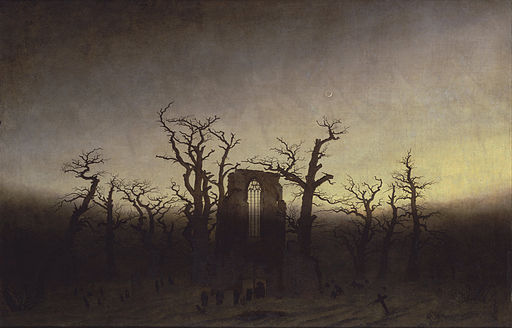 After settling into their newly found, or conquered, territory, the pioneers construct small towns and settlements, harness the natural resources of the region, and start to focus their energies on manufacturing, production, and trade. The Age of Pioneers thus ends, and the Age of Commerce – the next stage in a civilization’s lifespan – begins.
After settling into their newly found, or conquered, territory, the pioneers construct small towns and settlements, harness the natural resources of the region, and start to focus their energies on manufacturing, production, and trade. The Age of Pioneers thus ends, and the Age of Commerce – the next stage in a civilization’s lifespan – begins.
In the Age of Commerce, larger city centers are constructed, public infrastructure is laid down, and with the vast amounts of wealth created from production and trade, the arts are lavishly funded and monuments, palaces, museums, world wonders, and other such cultural edifices are constructed. In this age a civilization reaches what Glubb called the “High Noon of prosperity” – its peak of wealth and glory.
In spite of the magnificence, in the High Noon of Prosperity the seeds of civilizational collapse are planted. For shortly after it reaches its peak, the civilization transitions into the Age of Affluence, and the immense wealth starts to corrupt the civilization. Selfishness, greed, and vanity uproot the virtues of dedication, sacrifice and duty, that were the norm in past ages. Rather than regarding money as a byproduct of hard work and virtuous action, people seek money for its own sake and see it as the be all and end all – the ticket to salvation. And so, the god of Mammon, symbolic of the morally debasing influence of wealth, makes his appearance on the historical scene.
“The first direction in which wealth injures the civilization is a moral one…The object of the young and the ambitious is no longer fame, honour or service, but cash…The Arab moralist, Ghazali (1058-1111), complains…[that students] no longer attend college to acquire learning and virtue, but to obtain those qualifications which will enable them to grow rich.”
John Bagot Glubb, The Fate of Empires and Search for Survival
What is more, in the Age of Affluence access to luxuries, pleasures, and comforts abound, and even commoners possess the wealth and leisure to indulge in them. “A spoiled society begins to rot from within.”, William Ophuls explains. In adapting themselves to abundance, the people grow incapable of enduring even mild forms of hardship and suffering, and as the often repeated saying goes, good times create weak men. “Prosperity ripened the principle of decay.”, Edward Gibbon explained in reference to Rome.
The civilizational decline that occurs in the Age of Affluence is further hastened by an increasing preoccupation with welfare. As there is no shortage of wealth, commoners and rulers alike call on the State to use its monopoly on force to take money from some citizens in order to provide medical care, education, housing, social insurance, and government handouts, to others. And as Ophuls writes:
“Affluence fosters a sense of entitlement, as well as a feeling that none should be left behind. The upshot is a welfare state with a burgeoning roster of clients and a growing burden of subsidies, along with a corresponding loss of personal responsibility and independence.”
William Ophuls, Immoderate Greatness
At the peak of Rome’s affluence, for example, between the rule of Emperor Augustus and Emperor Claudius, nearly one in three citizens were on the Roman dole and approximately 200 000 families received free wheat from the State. A mere generation or so later, Rome began its irreversible process of decline.
“It may perhaps be incorrect to picture the welfare state as the high-water mark of human attainment. It may merely prove to be one more regular milestone in the life-story of an ageing and decrepit empire.”
John Bagot Glubb, The Fate of Empires and Search for Survival
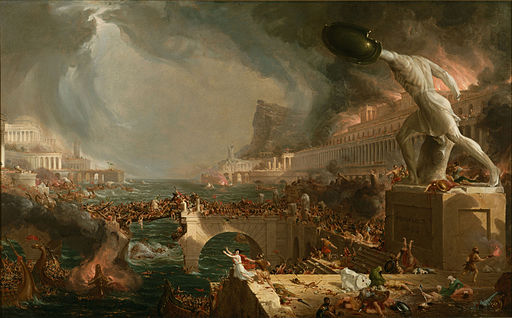 With the safety net of welfare, and with an abundance of wealth, the population no longer needs to devote the majority of its waking hours to securing the necessities of life. Many, therefore, turn their attention to intellectual pursuits. The Age of Affluence gives way to the Age of Intellect, and the civilization continues its decline.
With the safety net of welfare, and with an abundance of wealth, the population no longer needs to devote the majority of its waking hours to securing the necessities of life. Many, therefore, turn their attention to intellectual pursuits. The Age of Affluence gives way to the Age of Intellect, and the civilization continues its decline.
Few would deny the immense benefits that intellectual pursuits bestow on the individual and society at large, however, as with most things in life, there can be too much of a good thing. And one of the characteristics of the Age of Intellect is that an excessively one-sided rationalistic approach to life saturates the civilization. To paraphrase Nietzsche, in the Age of Intellect rationality is turned into a tyrant and reason is viewed as the only means of discovering the truth. As a result, the symbolic, moral, and often irrational truths embedded in myth and religion are discarded, and the civilization loses the pillars upon which it was built. Nietzsche, for example, implicated the extreme rationality exemplified by Plato and Socrates as a “symptom of degeneration, a tool of the Greek dissolution.” (Nietzsche, Twilight of the Idols), and as he continued:
“Without myth…every culture loses its healthy creative natural power.”
Nietzsche, The Birth of Tragedy
Or as the historians Will and Ariel Durant wrote:
“Even the skeptical historian develops a humble respect for religion, since he sees it functioning, and seemingly indispensable, in every land and age…The soul of a civilization is its religion, and it dies with its faith.”
Will and Ariel Durant, The Lessons of History
Along with the decline of religion and myth, the Age of Intellect is also characterized by the rise of highly rational and critical intellectuals, who thrive in dissecting and tearing down the dominant systems of beliefs and values. Referring to Rome’s Age of Intellect, the historian Edward Gibbon wrote:
“A crowd of critics, of compilers, of commentators, darkened the face of learning, and the decline of genius was soon followed by the corruption of taste.”
Edward Gibbon, Decline and Fall of the Roman Empire
As these critical theories spread, traditional moral codes give way to moral relativism, and the faith that life has meaning is replaced by existential nihilism. A majority of the people come to believe that there is no such thing as objective truth, that nothing is inherently moral or valuable, and that there is no meaning to the historical process, nor to life. And as William Ophuls writes:
“…thanks to the demolition job performed by the intellectuals, the society is increasingly “value free”—that is, it no longer believes in much of anything or takes anything seriously. The original élan, the moral core, and the guiding ideal of the civilization are now a distant memory.”
William Ophuls, Immoderate Greatness
Following this intellectual demolition job, the Age of Decadence – the terminal stage in a civilization’s lifespan – sets in. Without an overarching guiding ideal or moral core, there exists widespread disorientation, confusion, and moral decay. The masses live empty and meaningless lives from which they seek relief by drowning themselves in base pleasures, developing addictions, and by adopting escapism as a way of life. People grow increasingly incapable of distinguishing between true and false, good and bad, right and wrong, and so they often choose what is life-denying and harmful. Beauty and genius are renounced in favor of banality, ugliness and vulgarity. Virtues are seen as vices, and vices virtues. The process of individuation and pursuit of greatness is abandoned in favor of an apathetic conformity. And as a result, mental illness becomes the norm.
“The society’s original vigor, virtue, and morale have been entirely effaced. Rotten to the core, the society awaits collapse, with only the date remaining to be determined.”
William Ophuls, Immoderate Greatness
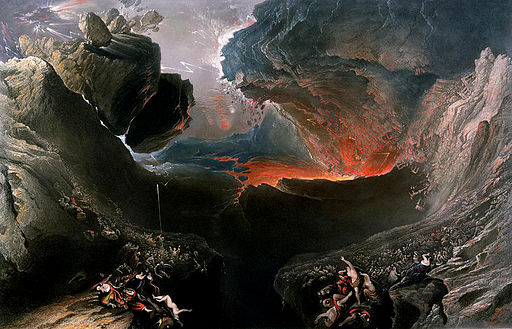 Referring to the decadence that started to infect Rome in the 1st century AD, the Roman historian Livy explains:
Referring to the decadence that started to infect Rome in the 1st century AD, the Roman historian Livy explains:
“Rome was originally, when it was poor and small, a unique example of austere virtue; then it corrupted, it spoiled, it rotted itself by all the vices; so, little by little, we have been brought into the present condition in which we are able neither to endure the evils from which we suffer, nor the remedies we need to cure them.”
Livy, Characters and Events of Roman History
Glubb Pasha echoes the conclusion of many other historians by stating that there is no escape from the progressive stages of a civilization’s lifespan. Due to the laws of human nature, each generation will modify itself in predictable ways based on the conditions generated by previous generations. If this is the case, we are forced to consider what William Ophuls calls an “unpalatable” conclusion:
“…civilization is effectively hardwired for self-destruction.”
William Ophuls, Immoderate Greatness
Yet civilizations may be hardwired for self-destruction for another reason. For throughout history the ruling, or political classes – through a combination of mismanagement and corruption – have played a prominent role in the decline and fall of civilizations. And in the next video we will examine this idea in more detail.
“This is the tragedy of civilization: its very “greatness”—its panoply of wealth and power—turns against it and brings it down.”
William Ophuls, Immoderate Greatness
– Come Like Us on Facebook – Check us out on Instagram –
– Sign Up for our Newsletter –


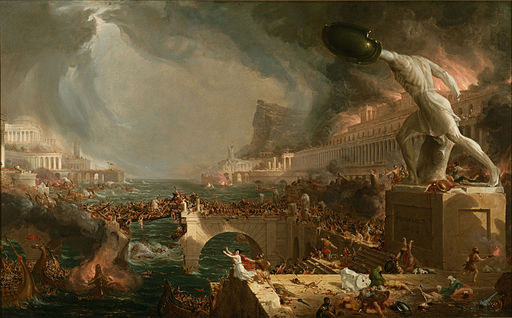
 academyofideas.com
academyofideas.com








